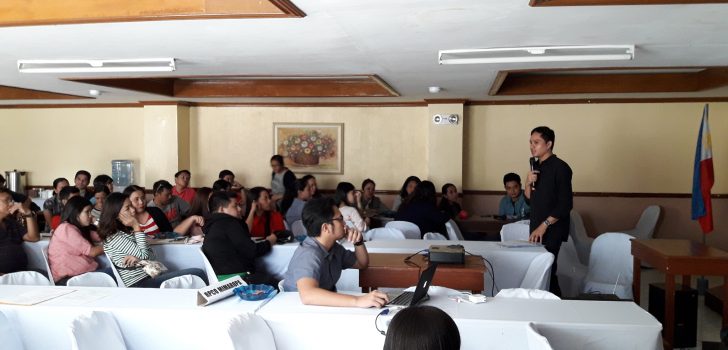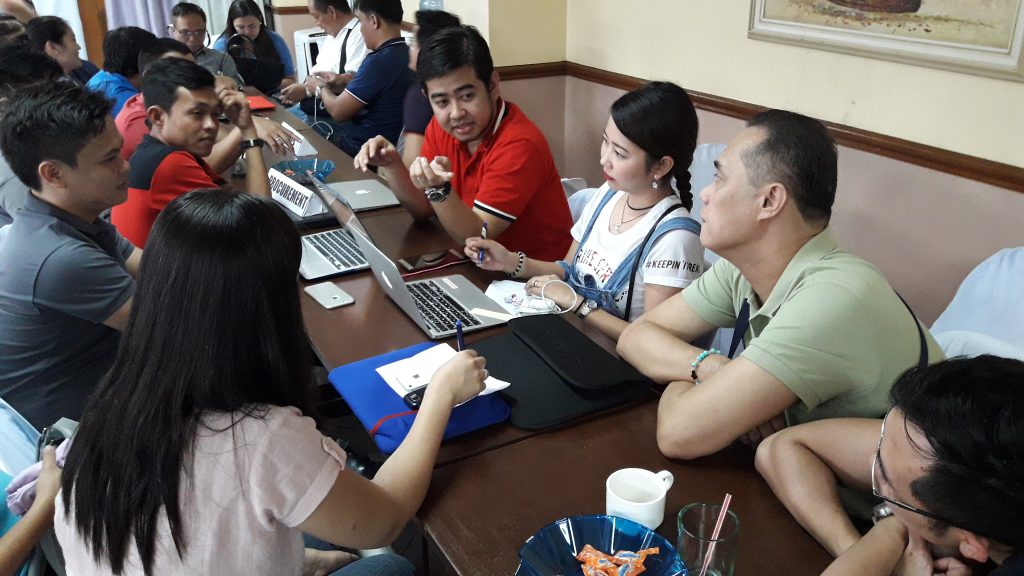 PRDP South Luzon PSO Director Shandy Hubilla presents the Project updates to the staff of the PSO and the RPCOs during the cluster’s year-end assessment. (Photo by Ana Francesca Chavez, DA-PRDP South Luzon PSO InfoACE Unit)
PRDP South Luzon PSO Director Shandy Hubilla presents the Project updates to the staff of the PSO and the RPCOs during the cluster’s year-end assessment. (Photo by Ana Francesca Chavez, DA-PRDP South Luzon PSO InfoACE Unit) PRDP South Luzon resets targets to accomplish more outputs
“Let’s change the way we do things,” PRDP South Luzon Project Support Office (PSO) Director Shandy Hubilla stressed during the PSO’s year-end assessment with the Regional Project Coordination Offices (RPCOs).
The Director presented the findings of the recent World Bank mission and announced that the Project received an overall rating of ‘MS’ or moderately satisfactory. He added that if the Cluster will not improve its performance before the next mission, the ‘MS’ might become a ‘U’ or unsatisfactory.
“This is not to bring you down, but to challenge you,” Hubilla stated. He explained that PRDP’s performance is evaluated in terms of how it meets the Project Development Objectives, not by the number of activities it conducted. “Our activities should help us achieve our objectives,” Hubilla said.
Focus on output-oriented activities
The PSO and RPCO components and units discussed their targets for 2017 during the workshop, which primarily aimed to harmonize the cluster’s work and financial plan (WFP) and procurement plan.
Hubilla encouraged the workshop participants to arrive at clear and measurable targets to prevent recurring problems. He also stated, “We don’t want to be driven by activities that drag us to many different directions.” Thus, he clarified that the cluster needs to focus on activities that will contribute to the Project outputs or intended results.
Proper documentation and regular monitoring
To improve the cluster’s performance in terms of subproject implementation and disbursement, the PSO components, especially the infrastructure development (I-BUILD) with many ongoing subprojects, will do regular and intensive monitoring.
The Director encouraged the components to prepare the relevant documentations for every site visit, meeting, or workshop that they will conduct. “Formalize everything through written documents so that our regional counterparts and the LGUs are well informed about the agreements, especially if it concerns compliance or workmanship issues,” Hubilla emphasized.
Hiring of additional staff
The critical roles of the procurement and finance units in the Project implementation were highlighted during the two-day assessment and planning workshop.
According to Hubilla, the challenge for the cluster is to reduce the number of subprojects for rebidding and increase the rate of disbursement. “We have to capacitate the cluster by hiring additional staff,” he said.
PSO Procurement Unit Head Michael Gregory Vargas also raised the need to hire additional procurement staff at the RPCO level. He stressed that the procurement units of the RPCOs need to be strengthened, because they are at the front line. In addition, he clarified that the PSO only plays a supervisory role.

The PRDP South Luzon Project Support Office procurement unit and its counterparts at the Regional Project Coordination Offices discuss their targets for 2017. (Photo by Ana Francesca Chavez, DA-PRDP South Luzon PSO InfoACE Unit)
Going back to the roots of PRDP
“We have to strategize very well. We have to come back to our root and that is our PCIPs,” Hubilla stated.
According to him, the challenge is to translate the Provincial Commodity Investment Plans (PCIPs) into subprojects especially for the I-REAP component.
As of January 2017, there are 40 I-REAP subprojects issued with No Objection Letter (NOL) 1 and two subprojects with NOL 2, compared with I-BUILD’s 27 subprojects with NOL 1 and 17 subprojects with NOL 2.
Director Hubilla urged the PSO and the RPCOs to put special attention to I-REAP and aggressively market it across LGUs. He reminded everyone that the PCIPs should serve as the main reference materials or take-off points for enterprise and infrastructure development subprojects that will support the cluster’s commodity value chain. ### (Gumamela Celes Bejarin, DA-PRDP South Luzon PSO InfoACE Unit)
